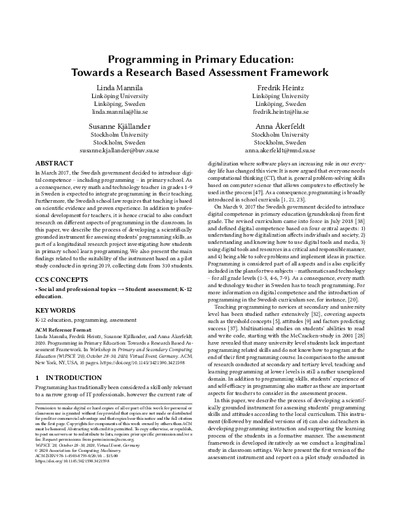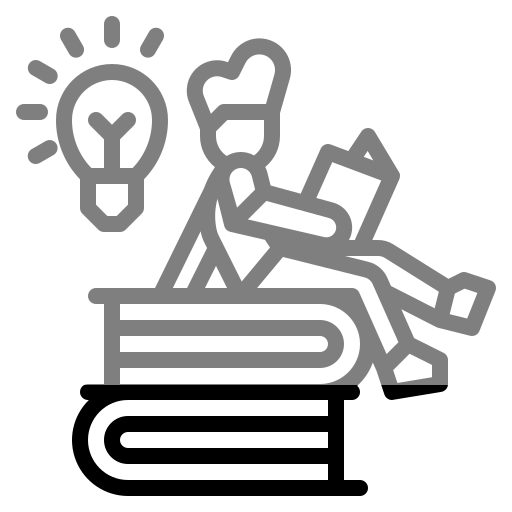Programming in primary educationtowards a research based assessment framework
Publikationsdatum:
Zu finden in: WiPSCE '20, 2020
|
 |
 Diese Seite wurde seit 2 Jahren inhaltlich nicht mehr aktualisiert.
Unter Umständen ist sie nicht mehr aktuell.
Diese Seite wurde seit 2 Jahren inhaltlich nicht mehr aktualisiert.
Unter Umständen ist sie nicht mehr aktuell.
 Zusammenfassungen
Zusammenfassungen

In March 2017, the Swedish government decided to introduce digital competence - including programming - in primary school. As a consequence, every math and technology teacher in grades 1-9 in Sweden is expected to integrate programming in their teaching. Furthermore, the Swedish school law requires that teaching is based on scientific evidence and proven experience. In addition to professional development for teachers, it is hence crucial to also conduct research on different aspects of programming in the classroom. In this paper, we describe the process of developing a scientifically grounded instrument for assessing students' programming skills, as part of a longitudinal research project investigating how students in primary school learn programming. We also present the main findings related to the suitability of the instrument based on a pilot study conducted in spring 2019, collecting data from 310 students.
 Dieses Konferenz-Paper erwähnt ...
Dieses Konferenz-Paper erwähnt ...
 Personen KB IB clear | Albert Bandura , Tim Bell , Jens Bennedsen , Jonas Boustedt , Shannon Campe , Michael E. Caspersen , Damon Chizuru Kawamoto , Jill Denner , Caitlin Duncan , Anna Eckerdal , Shelly Engelman , Jessika Golle , Shuchi Grover , Josef Guggemos , Mark Guzdial , Fredrik Heintz , Luzia Leifheit , Albert Lionelle , Linda Mannila , Robert McCartney , Korbinian Moeller , Jesús Moreno-León , Jan Erik Moström , Manuel Ninaus , Lars-Åke Norden , Klaus Ostermann , Miranda C. Parker , Arnold Pears , Mark Ratcliffe 0001 , Gregorio Robles , Marcos Román-González , Kate Sanders , Sabine Seufert , Ulrich Trautwein , Katerina Tsarava , Linda L. Werner , Susan Wiedenbeck , Chris Wilcox , Jeannette M. Wing , Carol Zander | |||||||||||||||||||||||||||||||||||||||||||||||||||||||||||||||||||||||||||||||||||||||||||||||||||||||||||||||||||||||||||||||||||||||
 Begriffe KB IB clear | Dr. Scratch
,  LehrerIn LehrerIn teacher
, teacher
,  Primarschule (1-6) / Grundschule (1-4) Primarschule (1-6) / Grundschule (1-4) primary school
, primary school
,  Programmieren Programmieren programming
, Programmieren für KinderProgramming for kids programming
, Programmieren für KinderProgramming for kids
| |||||||||||||||||||||||||||||||||||||||||||||||||||||||||||||||||||||||||||||||||||||||||||||||||||||||||||||||||||||||||||||||||||||||
 Bücher |
| |||||||||||||||||||||||||||||||||||||||||||||||||||||||||||||||||||||||||||||||||||||||||||||||||||||||||||||||||||||||||||||||||||||||
 Texte |
|
 Dieses Konferenz-Paper erwähnt vermutlich nicht ...
Dieses Konferenz-Paper erwähnt vermutlich nicht ... 
 Nicht erwähnte Begriffe | Schule, Unterricht |
 Tagcloud
Tagcloud
 Zitationsgraph
Zitationsgraph
 Zitationsgraph (Beta-Test mit vis.js)
Zitationsgraph (Beta-Test mit vis.js)
 Zeitleiste
Zeitleiste
 1 Erwähnungen
1 Erwähnungen 
- Teaching Coding in K-12 Schools - Research and Application (Therese Keane, Andrew Fluck) (2023)


- Introducing Programming Concepts Through the Bebras Tasks in the Primary Education (Lina Vinikienė, Valentina Dagienė, Gabrielė Stupurienė)


- Introducing Programming Concepts Through the Bebras Tasks in the Primary Education (Lina Vinikienė, Valentina Dagienė, Gabrielė Stupurienė)
 Anderswo finden
Anderswo finden
 Volltext dieses Dokuments
Volltext dieses Dokuments
 |  Programming in primary education: Fulltext at the ACM Digital Library ( Programming in primary education: Fulltext at the ACM Digital Library ( : :  , 1140 kByte; , 1140 kByte;  : :  ) ) |
 Anderswo suchen
Anderswo suchen 
 Beat und dieses Konferenz-Paper
Beat und dieses Konferenz-Paper
 Beat hat Dieses Konferenz-Paper während seiner Zeit am Institut für Medien und Schule (IMS) ins Biblionetz aufgenommen. Beat besitzt kein physisches, aber ein digitales Exemplar. Eine digitale Version ist auf dem Internet verfügbar (s.o.). Es gibt bisher nur wenige Objekte im Biblionetz, die dieses Werk zitieren. Beat selbst sagt, er habe dieses Dokument überflogen.
Beat hat Dieses Konferenz-Paper während seiner Zeit am Institut für Medien und Schule (IMS) ins Biblionetz aufgenommen. Beat besitzt kein physisches, aber ein digitales Exemplar. Eine digitale Version ist auf dem Internet verfügbar (s.o.). Es gibt bisher nur wenige Objekte im Biblionetz, die dieses Werk zitieren. Beat selbst sagt, er habe dieses Dokument überflogen.
























 Biblionetz-History
Biblionetz-History